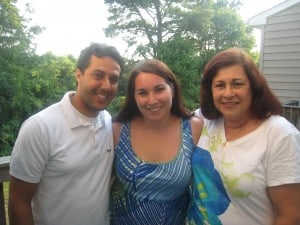 Imagine you are a 20-something newlywed with a full time job, busy making a life in a new city. A local Reform synagogue approaches you and your spouse with a plea for help.
Imagine you are a 20-something newlywed with a full time job, busy making a life in a new city. A local Reform synagogue approaches you and your spouse with a plea for help.
“Please help! The Temple Youth Group is in desperate need of adult supervision. We’ve heard you’ve got some experience in this department. Won’t you consider giving up your Sunday mornings, several long weekends and even a few weeknights a month for our teens?!”
The average young couple might smile, offer a remorseful excuse about not wanting to make such a big commitment, and promise to consider it in a few years. Or, you might get lucky. One half of this young Jewish couple might have attended a Union of Reform Judaism camp as a child or may have participated in National Federation of Temple Youth as a teenager. Perhaps they worked summers together at a URJ Camp, or maybe one spent time working as a synagogue youth program director between college and graduate school. If you get lucky, you might find a couple who had their own remarkable experiences with the URJ youth movement—remarkable enough to think about forgoing their personal time for a Temple Youth Group.
You might get lucky enough to meet young Jewish adults like my daughter and son-in-law, Amy and Eliot Weinstein. When Ohef Sholom Temple approached them to fill the roles of TYG Advisors for their growing youth group, my daughter immediately called home. “Mom, they’ve already got 10 kids signed up for a regional NFTY-MAR event! How can we not do this? Besides, it’s what we do.” Who was I to argue with them, and with that statement? Who was I to tell her this might be a big commitment to take on at this point in their lives? They were so excited at the prospect of getting involved with TYG and NFTY events again.
Ultimately, the staff and lay leadership of Ohef Sholom Temple saw leadership potential in Amy and Eliot—and they chased it. Temple leaders were able to appeal to their interests and not only got them in the door, but made them valuable members of the congregation. Again, how could I argue with this? I try to do this in my role as Women of Reform Judaism’s first vice president of the Mid-Atlantic District, and advising other Sisterhood leaders to do the same. My daughter always tells people that WRJ is “part of who she is,” because she has grown up with it. However, at this moment, that’s not where she wants to contribute. She wants to contribute by staffing shul-ins, running youth services, and even hosting NFTY-MAR’s Fall Kallah with the Ohef Sholom Temple Youth (OSTY) group.
At the end of the day, I didn’t argue with my kids about their choice at all—and after their first school year as OSTY’s advisors, I’m glad I chose to support their decision. As busy as they might be, they are making a meaningful contribution to their congregation, and enjoying every minute. I am immensely proud that both Amy and Eliot have the Jewish foundation and education to recognize the importance of what they are doing with their Sunday mornings and weekends. They are using their positive Reform Jewish experience to shape the experience of the teens in their youth group, the future leadership of the URJ. So that when another Reform congregation is looking for a young 20-something to fill the important role of TYG advisor, there is a large cadre of young, engaged Jewish adults ready and willing to fill that role.
—Ellen Wagner serves as first vice president of the Mid-Atlantic District and as a member of the board of directors for the Women of Reform Judaism.
—Amy Weinstein is the Young Adult Division director for UJFT.
